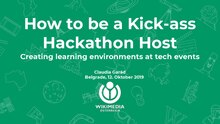Wikimedia CEE Meeting 2019/Programme/Submissions/How to be a Kick-ass Hackathon Host

- Title of the submission
How to be a Kick-ass Hackathon Host
- Type of submission (lecture, panel, workshop, lightning talk, roundtable, poster)
- Lecture
- Author(s) of the submission
Claudia Garád, Klára Joklová (tbc)
- Username(s)
- Affiliation
Wikimedia Österreich & Wikimedia Česká republika (tbc)
- Topic(s)
- Technology
- Abstract (up to 100 words)
WMAT and WMCZ have both hosted the international Wikimedia Hackathon in past two years. We learned a lot in this process: to organize a successful international tech event, to use this event to attract and retain new tech volunteers, to generate and deepen partnerships as well as sponsor relations and to generate welcoming and inclusive event spaces. With this presentation we would like to share what we learned and encourage other CEE communities to host tech events in the future.
- How will this session be beneficial for the communities in the region of Central and Eastern Europe?
Learn how hosting a tech event can help to grow your tech community.
- Special requirements
- Slides or further information

- Documentation
Interested attendees[edit]
If you are interested in attending this session, please sign with your username below. This will help reviewers to decide which sessions are of high interest. Sign with a hash and four tildes. (# ~~~~).
Notes[edit]
- They organized Hackathon in 2018 in Vienna. One of the ideas that events like this that you include a lot of other communities if they are interested.
- They had multiple pre-events for a hackathon in a couple of countries.
- A lot of things happened since we hosted. How to refine and develop a rotating event?
- How to make the best event when it is happening every year in different countries. Based on visiting other hackathons they developed their concept.
- You need to be very clear to people who attend. You need to be nourished and to plan when will you sleep.
- How to get new participants? They looked a little beyond their boundaries. Jugend hack is an organization they have learned a lot from because they were making a hackathon for kids, and most o the thing worked for adults too.
- The mentoring program is what they came up with. Mentors are there for making sure everybody gets help. They manage expectations between those people who are helping and those who need help. Mentors should be celebrated as the new ones because without them it would not be that possible. Mentors mentor handbook, coordinate program, daily check-in, suggest projects, tasks and create a sense of achievement for all newcomers. They made a new communication channel. Also, they brought a lot of female mentors.
- The comments for their hackathon were positive.
- Results: more productivity, more diversity (20% female, 76% male and 4% non-binary).
- Advice: be bold. Better try and fail then don't do it at all. Seek for inspiration outside the Wikiverse, teach newcomers to take commitment, time and resources, also cherish mentors and their work for our movement.
- They have a really nice Wikidata community but the improvement is always needed.
- The WMF Support team helped them a lot, they support for volunteer developers, onboarding new developers, technical help.
- Q1: Do you have all of this information in one place?
- A1: Yes, we have it on resources, and it can help with any kind of event, not only with the hackathon.
- Q2: Is there any kind of technical skill minimum required for the hackathon?
- A2: There are many more facets to the technical work than programming
